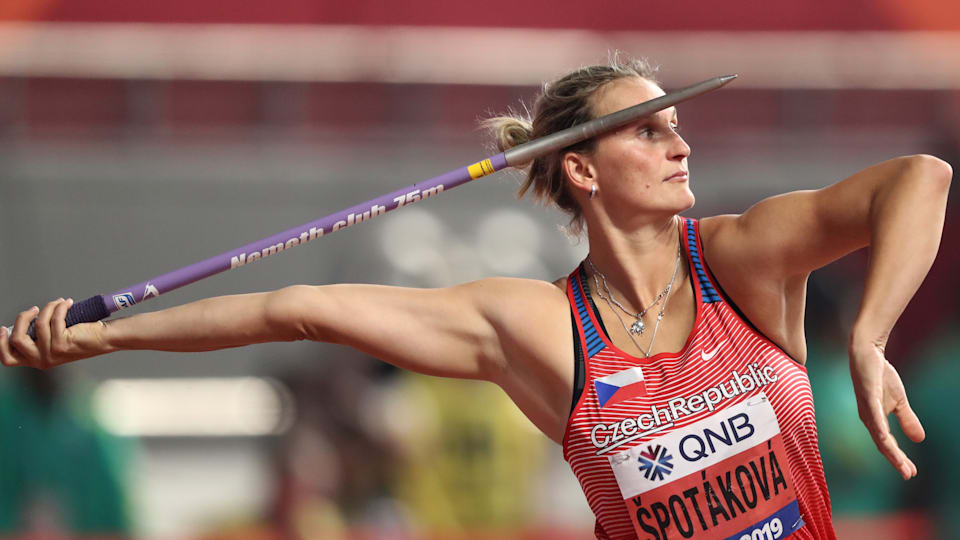
At 38, javelin ace Barbora Spotakova is in the twilight of her glorious career.
The Czech has two Olympic gold medals to her name and took bronze at Rio 2016 before claiming her third world title in London the following year.
Since giving birth to her second child in 2018, world record holder Spotakova has struggled to recapture her very best form and finished ninth at last year's World Championships in Doha.
But the punk rock fan is determined to give it one last go at Tokyo 2020 and try and match her former coach, men's world record holder Jan Zelezny, by claiming medals at four consecutive Olympic Games.
Spotakova spoke to Olympic Channel before winning on her seasonal debut in Kladno on 1 June.
"I am a fighter and I will try definitely but it will be very hard, that's for sure." - Barbora Spotakova on her medal chances at Tokyo 2020
Olympic Channel: Tell us about your return to action in 2019 after giving birth to your second child, and do you have any advice on coming back after childbirth?
Barbora Spotakova: I was not so satisfied because I had still some problems with my Achilles. I guess it was mostly because I was not sleeping enough and I was really tired. That showed then after in my health problems.
My recipe is not to stop, even when you're pregnant. Do some easy easy jogging or something, not anything heavy but just a little bit. Always keep in mind that you want to continue, that's the most important thing. You never say, "Now I quit for one year and then I start again." You need to still keep going.
OC: What's the secret to your longevity?
BS: I guess my family life, my partner because he supports me a lot. And my attitude to sport because it's my hobby, it's something I've liked since I was young... I guess I cannot be without moving or without running. I love to run, I love to move... I cannot imagine my life without sport.
I hope I've been able to show that you can last long in javelin. I hope I can show that my technique looks easy, like you don't have to be a weightlifter or a very strong person. And that's it's possible to be successful with kids, with all kinds of years (ages). Everybody has some kind of problems but you can always get over it and I hope that I show this a little bit.
OC: How much is javelin a mental sport?
BS: I mean, it's a very technical sport. You need to work a lot on your technique. It's about thinking or talking with your coach about technique and thinking something new about the technique and I guess that's why the Czech people are so good in javelin because we have very good throwers who pass their experience to the next generation.
It's not about only weightlifting and running so I guess a lot of it is a mental sport, but what kind of sport is not a mental sport?
OC: How far do you think women can throw the javelin?
BS: Now it's not as good as 10 years ago, so I hope the next generation comes and they will throw again 70 metres. I guess that the line is 70m in women's javelin. I'm not the only one who was able to throw 70m so I hope that the days when others will throw 70m come very soon.
OC: Do you think your world record (set in 2008) will be broken soon?
BS: I'm happy that I'm still world record holder and, I don't know, it's not so difficult in javelin because you can get good conditions - good wind or something - and you can add five metres very easily so it can happen soon. I cannot see any person right now but, you know, everybody can appear in one moment. So I'm prepared that it can come very soon but it's been a while already so I'm happy for that.
OC: What would it mean for you to win a fourth Olympic medal in Tokyo next year or even a third gold?
BS: I'm thinking to take part at Tokyo is my goal. Maybe if I feel very good before, the medal... I always want to reach the medal but it gets very difficult as the years come. But I am a fighter and I will try definitely but it will be very hard, that's for sure. I dream, of course, but I don't say the dream's open.
OC: Do you still like rock music? Which bands do you enjoy listening to and do you listen to them while training?
BS: I don't listen during running, during training. I don't like different rhythms. I like more to listen to my body and how it works so it's not my favourite thing.
Sometimes before competition, to motivate me, I listen to the Czech band Tri Sestry or Cock Sparrer, the British punk band. I like those two the most.
OC: Olympic Channel made a film, 'The Nagano Tapes', about the Czech ice hockey team winning gold at the 1998 Winter Olympic Games. Have you seen it and why was that moment so important for the nation?
BS: Of course, I have seen it. I really liked it. It's important for me because I remember all the moments so it reminds me of all of that. It's very well done, I like it very much.
It's important... well, of course we won gold and this was a huge thing for the Czech Republic and everybody can remember that. Of course, we are a small country and we fight against big countries who try to be the best in hockey. We are just 10 million people and we became the Olympic champions, so that's our history and we are proud of that.
